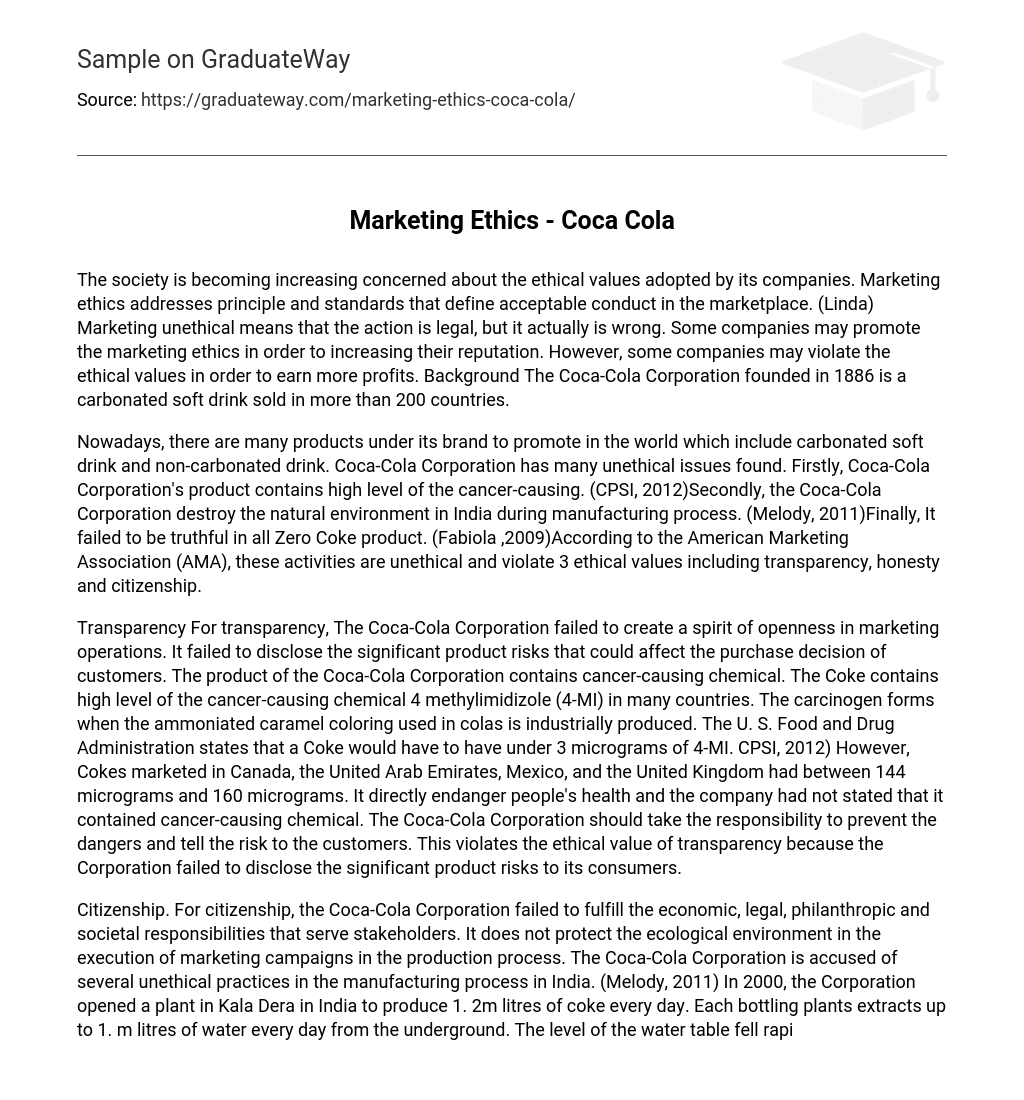The society is becoming increasing concerned about the ethical values adopted by its companies. Marketing ethics addresses principle and standards that define acceptable conduct in the marketplace. (Linda) Marketing unethical means that the action is legal, but it actually is wrong. Some companies may promote the marketing ethics in order to increasing their reputation. However, some companies may violate the ethical values in order to earn more profits. Background The Coca-Cola Corporation founded in 1886 is a carbonated soft drink sold in more than 200 countries.
Nowadays, there are many products under its brand to promote in the world which include carbonated soft drink and non-carbonated drink. Coca-Cola Corporation has many unethical issues found. Firstly, Coca-Cola Corporation’s product contains high level of the cancer-causing. (CPSI, 2012)Secondly, the Coca-Cola Corporation destroy the natural environment in India during manufacturing process. (Melody, 2011)Finally, It failed to be truthful in all Zero Coke product. (Fabiola ,2009)According to the American Marketing Association (AMA), these activities are unethical and violate 3 ethical values including transparency, honesty and citizenship.
Transparency For transparency, The Coca-Cola Corporation failed to create a spirit of openness in marketing operations. It failed to disclose the significant product risks that could affect the purchase decision of customers. The product of the Coca-Cola Corporation contains cancer-causing chemical. The Coke contains high level of the cancer-causing chemical 4 methylimidizole (4-MI) in many countries. The carcinogen forms when the ammoniated caramel coloring used in colas is industrially produced. The U. S. Food and Drug Administration states that a Coke would have to have under 3 micrograms of 4-MI. CPSI, 2012) However, Cokes marketed in Canada, the United Arab Emirates, Mexico, and the United Kingdom had between 144 micrograms and 160 micrograms. It directly endanger people’s health and the company had not stated that it contained cancer-causing chemical. The Coca-Cola Corporation should take the responsibility to prevent the dangers and tell the risk to the customers. This violates the ethical value of transparency because the Corporation failed to disclose the significant product risks to its consumers.
Citizenship. For citizenship, the Coca-Cola Corporation failed to fulfill the economic, legal, philanthropic and societal responsibilities that serve stakeholders. It does not protect the ecological environment in the execution of marketing campaigns in the production process. The Coca-Cola Corporation is accused of several unethical practices in the manufacturing process in India. (Melody, 2011) In 2000, the Corporation opened a plant in Kala Dera in India to produce 1. 2m litres of coke every day. Each bottling plants extracts up to 1. m litres of water every day from the underground. The level of the water table fell rapidly in the underground in India and cause a serious health hazard due to the overexploited the underground area of the Coca-Cola Corporation. However, the Coca-Cola Corporation does not have any respond on this issue. This violates the ethical value of citizenship because the Corporation failed to protect the ecological environment. Honesty For honesty, the Coca-Cola Corporation failed to be forthright in dealings with customers and stakeholders.
It failed to be truthful in all situations and at all times. The Coca-Cola Corporation introduced a new product Coca-Cola Zero in 2005, and claimed that the product is a low calorie and no sugar in the Coke. However, this is not true at all. The Coca-Cola Corporation use an artificial sweetener instead of sugar which is harmful to people’s health. (Fabiola ,2009) Health officials said tests show the cola contains sodium cyclamate which is a relatively inexpensive artificial sweetener banned by the U. S.. The consumers had misleading by the product name, Zero.
The Corporation should clearly stated that Coca-Cola Zero is used an artificial sweetener and the risk to the customers. This violates the ethical value of honesty because the Corporation failed to tell the truth to customers. Conclusion To conclude, the reputation of the Coca-Cola Corporation has been decreased because of the mentioned unethical activities. The Coca-Cola Corporation should not just focus on their sales and benefits, but also be responsible and ethical to the community and environment. The Coca-Cola Corporation need to clearly stated out the truth and the risks to its customers.





